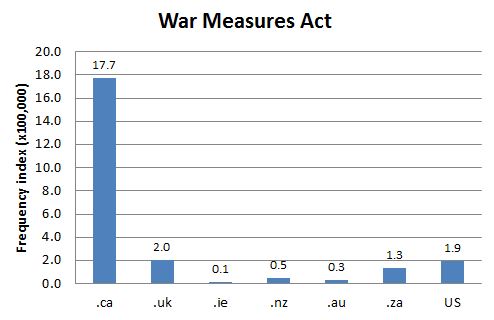DCHP-2
War Measures Act DCHP-2 (June 2016)
n. — Politics, Administration
a statute allowing the federal Cabinet to govern by decree during a national emergency or state of war.
Type: 5. Frequency — The War Measures Act was passed into law at the beginning of WWI to give the government the right to bypass Parliament in times of perceived external or internal threats to the nation. It was enacted during both World Wars and, most notably, in October of 1970 by Prime Minister Pierre Trudeau in response to the kidnapping of two government officials by the FLQ, a terrorist Quebec separatist/sovereignist group. The Act gave the government power to detain and arrest individuals without warrant, and therefore was the subject of much criticism among civil liberties advocates (see, e.g. the 2013 quotation). In 1988, the War Measures Act was replaced by the "Emergency Act" (see Canadian Encyclopedia reference and the 1988 quotation). The term remains most prevalent in Canada (see Chart 1).
See also ITP Nelson, s.v. "War Measures Act", which is marked "Canadian".See also: separatist ((n.)) Front de Libération du Québec FLQ sovereignist Nisei
References:
- Canadian Encyclopedia "War Measures Act" Accessed 28 Jun. 2016
- ITP Nelson
Images:
Chart 1: Internet Domain Search, 19 Oct. 2012
